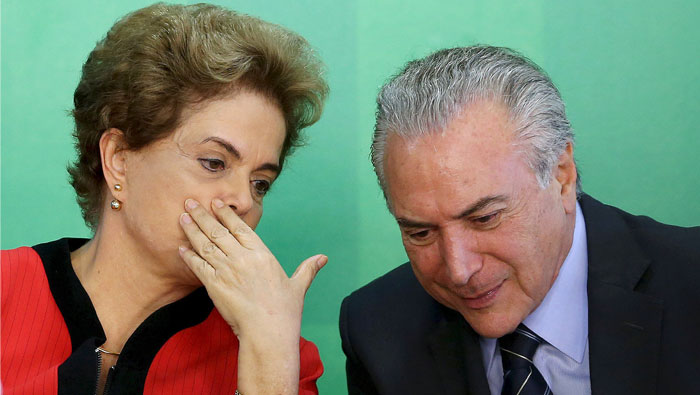
Brasilia: Brazil's largest party will decide on Tuesday to break away from President Dilma Rousseff's floundering coalition, party leaders said, sharply raising the odds she will be impeached amid a corruption scandal.
The fractious Brazilian Democratic Movement Party (PMDB) will decide at its national leadership meeting on the pace of disengagement from the Rousseff administration, in which it holds seven ministerial posts and the vice presidency.
A formal rupture appears inevitable and will increase the isolation of the unpopular Rousseff, freeing PMDB members to vote for her impeachment.
That makes it likely she will be temporarily suspended from office by Congress by early June and replaced by Vice President Michel Temer, leader of the PMDB, while the Senate decides if she should be permanently ousted.
Temer aides said the vice president is ready to take over and move fast to restore business confidence in Brazil, in an effort to pull Latin America's largest economy out of a tailspin. Brazilian media reported over the weekend that a team of Temer aides is drawing up a plan for his first weeks as president.
"On Tuesday we will be disembarking from this government. The vote for independence will win," PMDB Senator Valdir Raupp, who until recently had backed Rousseff, said by telephone.
Raupp said PMDB ministers would have to resign or leave the party, though a gradual withdrawal from those posts may take place as a compromise to keep the party united.
Party officials calculate that between 70 to 80 per cent of the 119 voting members of the directorate will vote to end the PMDB's alliance with Rousseff and her Workers' Party. One told Reuters that 75 had already pledged to do so.
Rousseff, a former Marxist guerrilla who is Brazil's first female president, has vigorously denied any wrongdoing and rejects impeachment charges that she manipulated government spending accounts to help her re-election in 2014.
The impeachment process only adds to the crisis that has hit Brazil, shaken to the core by its biggest ever corruption scandal - an investigation into political kickbacks to the ruling coalition from contractors working for state oil company Petrobras.
Rousseff's government is also grappling with Brazil's worst recession in decades and an epidemic of the mosquito-borne Zika virus, as it scrambles to host the Olympic Games in Rio de Janeiro in August.
The Petrobras scandal has weakened Rousseff by reaching her inner circle with allegations against her mentor and predecessor, Workers' Party founder Luiz Inacio Lula da Silva.
An attempt by Rousseff to appoint Lula to her Cabinet was the last straw for many of her allies who saw it as a desperate move to shield him from prosecution by a lower federal court that is overseeing most of the Petrobras case, a view fed by a wiretap recording of a conversation between them.
Brazil's top court is expected to decide later this week if Lula can indeed become a minister. If he is allowed, that means that only the Supreme Court can put him on trial under Brazilian law.
"The latest events make it very difficult for us to continue supporting the Workers' Party government. The feeling among the party rank and file across the country is that we should leave," said Jorge Picciani, leader of the PMDB in Rio de Janeiro, which had been a bastion of support for Rousseff until recent days.
Picciani said all but two of Rio's 12 voting delegates were in favor of quitting Rousseff's coalition.
The departure of the PMDB is expected to lead other smaller parties to bolt from the governing coalition, a domino effect that will further undermine Rousseff's ability to muster one third of the votes in Congress needed to block her impeachment.
The two largest, the Progressive Party (PP) and the Republican Party (PR), each with 40 seats or more in the lower chamber, have signaled that they are leaving.
"We don't want to be the last to abandon this ship," said PP Senator Ana Amelia.
An impeachment vote is expected as soon as mid-April in the lower house. If she fails to block it with the votes of 171 of its 513 members, Rousseff would face a trial in the Senate where she has lost crucial support, Senator Raupp said.
PMDB senators believe it would be almost impossible for them to stop the impeachment if it passes the lower house. Rousseff would be suspended for up to six months at the start of the trial and Temer would become acting president.
Temer is already looking at ways to cut public spending to tackle a widening fiscal gap that cost Brazil's its investment grade credit rating, the O Estado de S.Paulo newspaper reported on Sunday.
It said a small team of aides led by Wellington Moreira Franco, Rousseff's former civil aviation minister, is considering sweeping welfare cuts in social programs that would be carried out by the finance minister of a Temer government.
Two names under consideration for that job are former central bank governors Henrique Meirelles and Arminio Fraga, the newspaper said. A spokesman for Temer declined to comment on the report.